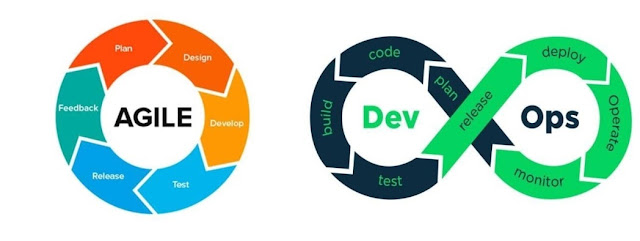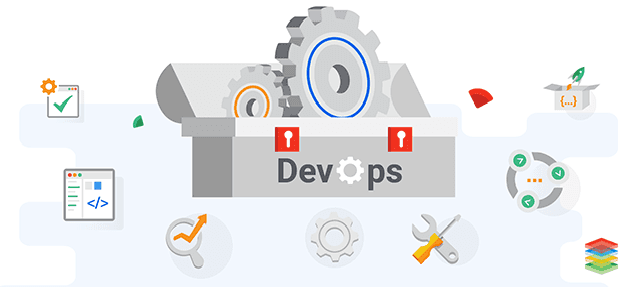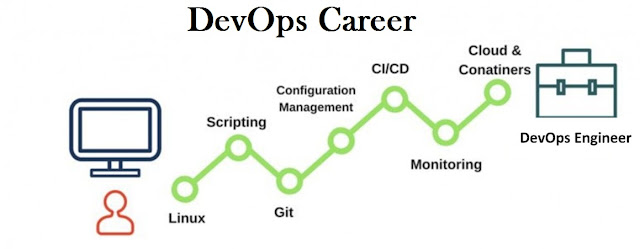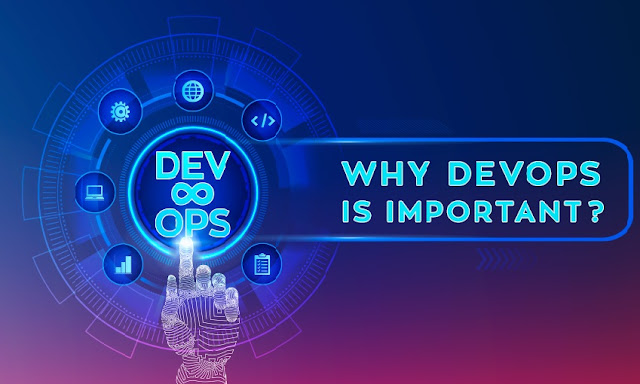Table of Contents
- DevOps Definition
- DevOps Background / History
- Relationship of DevOps to Other Approaches
- Is DevOps Matters?
- DevOps is also a Popular Technology
- What's beneath DevOps? Can DevOps want Coding?
- What's DevOps Testing?
- How to Adopt a DevOps Model?
- How can Azure DevOps operate?
- What is DevOps AWS?
- Assemble, Deploy and Integration
- Is DevOps a good Career for a fresher? Can there be any DevOps Certification?
- DevOps Goal
DevOps Definition
DevOps (Development and Operations) is the combination of cultural competencies, practices, and resources which increase an organization's capability to provide services and applications at the large velocity: evolving and enhancing products at a quicker pace than associations employing conventional application development and infrastructure management procedures.
Below a DevOps version, evolution from time to time, both of these teams have been merged into one team in which the engineers operate across the whole application life-cycle, from test and development to installation into operations, and create a selection of skills not confined to one purpose.
In certain DevOps versions, quality assurance and safety teams may also be closely integrated with operations and development and during the program life-cycle. When collateral is the attention
of everybody on a DevOps group, this may be known as DevSecOps.
These teams use clinics to automate processes that historically have been slow and manual. They utilize a technology pile and tooling that help them function and evolve software quickly, and faithfully.
DevOps Background / History
In 2007, Patrick Debois, a program development consultant, had the objective of learning all facets of IT. Within fifteen decades, Patrick had taken on a lot of distinct functions in IT to operate in each part of an IT company and gain a holistic comprehension of IT.
Patrick has taken a consulting project for a massive data center migration. He had been responsible for the testing, which meant he had been spending a great deal of time together with Dev and Ops. Patrick had been bothered by the gaps between how Dev and Ops functioned, but he became especially frustrated with all the challenges of handling work across both classes with this data-center migration.
Continuous Integration was gaining popularity at the agile community also was moving Dev nearer to installation, but there was nothing out there that fully spanned the split of Dev and Ops. Patrick was convinced there was a better method for both of these groups to work together.
In 2008, Andrew Shafer posted a thought for a spry foundation "birds of a feather" meeting at the Agile 2008 Conference. Patrick Debois saw the post and went to the meeting. Sadly, he was the one in particular who appeared. The thought was so inadequately got that Andrew didn't appear at his conversation.
While in 2009, John Allspaw, senior VP of specialized activities at Flickr, and Paul Hammond, head of designing at Flickr, gave an introduction at the O'Reilly Velocity
Conference in San Jose, "10+ Deploys every Day: Dev and Ops Cooperation at Flickr." The introduction laid the basis for how Dev and Ops can viably
cooperate to improve programming arrangement.
Patrick Debois watched the demonstration in Belgium utilizing a live stream and has been inspired to begin his summit, DevOpsDays, in Ghent, Belgium. The seminar brought together a lively group of forward-thinking heads hoping to enhance software installation. What might be even more significant is this group of individuals kept the dialogue going on Twitter using all the hashtag #DevOpsDays. In a bid to save Twitter personality space, people shortly dropped days along with also the hashtag became #DevOps.
After the face-to-face meetings spanned more and more individuals to have energized about DevOps until it had turned into a full-blown grassroots movement.
Up till 2011, the movement was fueled by people and open source tools with very little attention from analysts or sellers. Big vendors began to promote DevOps.
By 2012 DevOps was rapidly transforming into a trendy expression and DevOpsDays kept on developing.
Again in 2013, the people thirst for DevOps information prompted many writers to write novels on this issue.
After 2014, big companies like Target, Nordstrom, and LEGO became some of the first businesses to bring DevOps to the venture, and ever since that time, it's happening.
Relationship of DevOps to Other Approaches
- ArchOps
For DevOps practices, it presents an Extension; beginning from applications architecture artifacts, rather than source code, for performance installation. ArchOps says that architectural versions have been first-class entities in application development, installation, and operations.
- Agile
Complementary Roles are served by Agile and DevOps: many standard DevOps practices like automated build and evaluation, continuous integration, and constant delivery originated from the agile world, which date (informally) into the 1990s, and officially to 2001. Combining DevOps and Agile is beneficial for the company to get an added advantage. Additionally, DevOps has concentrated on the installation of developed applications, while it's created via Agile or alternative methodologies.
- DataOps
The program of Constant shipping and DevOps to information analytics was termed DataOps. DataOps attempts to incorporate data technology, data integration, data quality, data protection, and information privacy with operations.
- Systems Administration
DevOps is frequently viewed as a way of employing systems management work to cloud technology.
- DevSecOps, Shifting Security Left
DevSecOps is an enhancement of DevOps to permit for safety practices to be incorporated into the DevOps strategy. The conventional centralized security Team version should embrace a federated model enabling every shipping group that the capability to factor in the right safety controls in their DevOps practices.
- WinOps
It is the expression Employed for DevOps clinics to get a Microsoft-centric view.
- TestOps
TestOps would be to Hardware development exactly what DevOps would be to applications development. The notion is a tool-chain that joins test and design operations collectively. In the event of hardware, the layout means EDA tools as well as also the CAD division, and evaluation means digital measurement equipment like oscilloscopes and so forth.
- Continuous Delivery
Continuous Delivery and DevOps have shared targets and are frequently utilized in conjunction; however, there are subtle differences. While constant monitoring is focused on automating the procedures in application delivery, DevOps additionally concentrates on the organizational change to encourage great cooperation between the many functions required.
DevOps and constant Delivery reveal a frequent background in agile approaches and lean thinking: small and regular changes with concentrated value to the end client. Lean management and continuous delivery are fundamental to bringing value quicker, in a sustainable manner. Continuous delivery concentrates on making certain the program is in a releasable state during its life-cycle. That makes it more economical and less risky to provide the program.
Enriched Communication and cooperation both between and within organizational groups help achieve quicker time to market, together with decrease risks.
Is DevOps Matters?
Software and the Web have altered the entire world and its businesses, from purchasing to amusement. Software no longer only supports a company; instead, it turns into an integral part of every portion of an organization.
Businesses interact with their Clients through applications delivered as online applications or services and on all kinds of devices. They also utilize software to boost operational efficiencies by altering every region of the value string, like communications, logistics, and operations.
Similarly, those products companies transformed the way they design, construct, and deliver goods employing industrial automation during the 20th century, most businesses in the current world must change how they construct and deliver applications.
DevOps is also a Popular Technology
DevOps is your most buzzing word around IT business. It's a popular technology and innovative trend that's altering the end of Information Technology by easing organizations with improved endurance and performance. Do not misunderstand DevOps to get a pair of resources; it is a brand new software development strategy.
Additionally, you cannot have DevOps without a cloud. That does not imply cloud is critical to
embrace DevOps practices, however. Provided that a company has effective procedures for getting resources to set up and test program modifications, it may embrace a DevOps strategy.
A DevOps Engineer must handle the IT infrastructure according to the need for this supported application code that's devoted to a hybrid multi-tenant atmosphere. There's a requirement to get some funds for provisioning and obtaining the right installation model and for supporting and tracking the operation.
When it comes to DevOps, there's a requirement to have incremental and frequent adjustments in the code variations so that regular testing and installation are possible. It may not be always potential for DevOps Engineers to perform the programming from scratch; they all anyhow will need to understand about doing it.
There's a demand for DevOps Engineers to join a variety of components of programming combined with libraries and applications development kits and incorporate a variety of elements of SQL information direction or messaging programs for conducting software release together with the operating system as well as the manufacturing infrastructure.
DevOps Engineer’s Tasks:
- Experience in applications code testing and installation will smooth the travel of some DevOps Engineer.
- A company headquartered in the agile method of project direction will require DevOps Engineers into a completely different level. The agile methodology can help in the constant iteration of application testing and development.
- A DevOps Engineer has to be deploying different automation resources of DevOps for perfection. He/she is anticipated to possess a comprehensive understanding of software created through automation applications.
- A DevOps Engineer must exhibit decent communication skills and needs to be well-versed in dealing with groups.
- A DevOps Engineer is predicted to be operating with an assortment of open-source applications and technologies for handling source codes.
- Company knowledge of different computer programming languages and familiarity with fundamental notions of Linux is going to be useful. It's excellent to know any scripting language too.
- Capability to link with technical and business targets with alacrity ought to be the leading goal of a DevOps Engineer.
- Using a thorough understanding of IT operations and sysadmin functions to strategize the whole integration and installation procedure is beneficial.
What's beneath DevOps? Can DevOps want Coding?
DevOps life cycle incorporates Development, Testing, Integration, Deployment, and Monitoring. DevOps Engineer may operate with the development team personnel to attack the programming and scripting requirements. DevOps aids organizations in altering their code installation cycles and weeks rather than years.
A DevOps Engineer Will operate with development personnel to attack the programming and scripting needed to join elements of this code, like libraries or application development kits (SDKs) and incorporate different elements like SQL data direction or messaging programs which are required to execute the application release with working systems and manufacturing infrastructure.
Automation in DevOps
Automation is the best demand for DevOps clinic and 'Automate everything' is that the crucial principle of DevOps. Back in DevOps, automation kick begins by your code production on Developers machine until the code has been pushed into the code and also then to track the program and system from production.
Seven easy Measures to Assessing your DevOps automation:
- Creating the code.
- Testing it.
- Deploying the evaluation infrastructure.
- Running end-to-end tests.
- Code Deploying.
- Collecting metrics Out of production.
- End-to-end Orchestration of this DevOps pipeline.
What's DevOps Testing?
DevOps is about streamlining and automating your whole software delivery lifecycle. Automation frameworks along with CI tools like Jenkins and Bamboo can also be utilized to construct, install, and test software automatically when demands change to accelerate the launch procedure.
It's a basic Function for analyzing groups to align their evaluation design, test automation, and test case development with DevOps -- not just to confirm that code modifications work but the changes don't violate the item. A vital differentiation of all DevOps is analyzing maturity.
Constant Shipping (CD) would be to packaging and installation exactly what CI is to construct and test. Teams practicing CD may assemble, configure, and bundled applications and orchestrate its installation in such a manner it may be released into production within a software-defined way (low price, higher automation) at any moment.
Could Manual Tester eventually become a DevOps engineer?
There's no requirement to Proceed from QA into DevOps. Instead, you're able to embrace DevOps methodology together with QA Role. If you're in manual testing, then you need to just find automation testing then DevOps methodology or you can transfer yourself from guide tester function into SDET role.
How to Adopt a DevOps Model?
Transitioning to DevOps needs a Change in mindset and culture. In some establishments, there might not even be independent development and operations groups; engineers can do both. There are some crucial practices to implement DevOps and adopting its model.
Together with DevOps, the 2 teams operate Together to maximize the productivity of programmers and also the reliability of surgeries. They try to communicate regularly, increase efficiencies, and enhance the standard of services that they supply to clients. They take complete ownership of their services, often beyond where their said roles or names have traditionally been scoped by considering the end client's requirements and how they could contribute to solving those requirements.
Quality assurance and safety teams can also become closely integrated with these groups. Organizations with a DevOps version, irrespective of their organizational structure, have teams that see the whole infrastructure and development lifecycle as part of the responsibilities.
How can Azure DevOps operate?
Azure DevOps is the advancement of Visual Studio Team Services (VSTS). It is the result of many years of using their tools and creating a procedure for delivering and building goods productively and beneficially. What is more, each OSS project will acquire Azure Pipelines infinite build moments.
What is DevOps AWS?
AWS DevOps is now Amazon's response to implementing the most DevOps doctrine using its cloud system and dedicated instruments and solutions. As per the words, "AWS supplies a group of flexible solutions designed to allow businesses to rapidly and reliably assemble and deliver goods utilizing AWS and DevOps practices”.
- Authenticity
Verify the quality of Application infrastructure and updates changes so that you can reliably deliver at a faster pace whilst keeping up a favorable experience for users. Use practices such as constant integration along with constant shipping to check that every shift is practical and secure. Tracking and logging techniques help you keep informed of functionality in real-time.
- Safety
Move quickly while keeping preserving and control compliance. It's possible to embrace a DevOps version without sacrificing protection using automatic compliance policies, fine-grained controllers, and configuration control methods. By way of instance, using infrastructure like code and coverage as code, you can specify and then monitor compliance in scale.
- Speed
Proceed at High-speed so that you may innovate for clients quicker, adapt to shifting markets, and develop more effective at driving business benefits. The DevOps version enables your programmers and operations groups to attain such outcomes. By way of instance, micro-service along with constant shipping let teams require ownership of providers and after that release upgrades to them faster.
- Enriched Collaboration
Construct more successful teams beneath a DevOps cultural design, which emphasizes values like ownership and liability. Programmers and operations groups collaborate carefully, share many duties, and unite their workflows. This reduces inefficiencies and conserves time (e.g. reduced handover intervals between programmers and surgeries, writing code which accounts for the environment in that its run).
- Quick Delivery
Boost the frequency and rate of releases so that you may innovate and increase your merchandise quicker. The faster you're able to launch new features and fix bugs, the quicker you can respond to your clients' requirements and build a competitive edge. Constant integration along with continuous delivery is practices that automate the software release process, from constructing to deploy.
- Scale
Run and handle your infrastructure and growth procedures in scale. Automation and consistency assist you to handle changing or complex systems effectively and with lower risk. By way of instance, infrastructure like code makes it possible to handle your advancement, testing, and manufacturing environments in a much more efficient and much more efficient method.
- Risk Control
Utilizing this clinic, we could determine the hazard variable early in the program life-cycle phases. Early detection of some problems or bugs and speedy correction or repairs assists to stay ahead from the contest.
Assemble, Deploy and Integration
For Integration we could synthesize on Jenkins, Travis CI, or even Bamboo, to handle your program assembles and according to your program demand, we could use Maven or even Gradle for both building and hastening growth and productivity. You might even select Docker, Kubernetes, Chef, Ansible, and Puppet that are extremely famous tools for your installation.
DevOps is a Cultural transformation of an IT business. It brings new dimensions to how software is designed and delivered. The classic development process doesn't encourage close cooperation among programmers and surgeries. Therefore DevOps is neither simple nor hard; it is dependent upon how you perceive it.
Why Move, Python, Scala, Ruby, and C are? Fantastic programming languages such as DevOps teams (and also why JavaScript is not).
Is DevOps a good Career for a fresher? Can there be any DevOps Certification?
Candidates preparing for a profession in DevOps are correct at wondering ‘Is DevOps a great career for fresher?' But, you can pay attention to the assorted DevOps certification training classes which may help fresher prepare for a profession in DevOps. Fresher applicants may favor unique paths for developing abilities.
The AWS Accredited DevOps Engineer -- Expert examination is meant for people who play a DevOps engineer job with a few years of expertise provisioning, working, and handling AWS environments.
Here are some best ways to reverse yourself to an essential DevOps Engineer
- Construct the skills the job you've got for the job that you desire
- Build your brand with neighborhood participation
- Start cross-training now
- Navigation: Prove you can find a lot done using a bit
- Demonstrate curiosity and compassion
Roles and Responsibilities of DevOps:
- Ability to use a wide range of open source technologies and tools
- Ability to code and script
- Understanding experience in automation tools
- Experience with systems and IT operations
- Knowledge of Testing
- Data management skills with strong focus on business outcomes
- Comfort with collaboration, open communication and reaching across functional borders
DevOps Goal
Improve cooperation between all Clients from going through automation and delivery of the shipping process so that you can:
- Reduced failure rate of releases
- Boost mean time to heal
- Achieve faster time to Promote
- Boost deployment frequency
- Shorten the lead time between repairs
Following the 2015 state of DevOps Report, "high-performing IT organizations employ 30xs more often with 200x shorter lead times; they've 60x fewer failures and regain 168xs faster".
A Common Pre-DevOps Scenario, a program team matches before beginning out a new program project. The group includes programmers, developers, operations, and assistance specialists. This group intends how to make working applications that are prepared for installation. Every day fresh code is set up as the programmers complete it.
Following the code moves the entire automatic testing its set up to a small number of consumers. The code is tracked for a brief period to guarantee there aren't any unforeseen issues and it's stable. The code is then proliferated into the users after the observation proves that it's Stable. Some, if not all, measures after development and planning are done without any human intervention.
Read More : Isobutyryl Chloride










0 comments:
Post a Comment